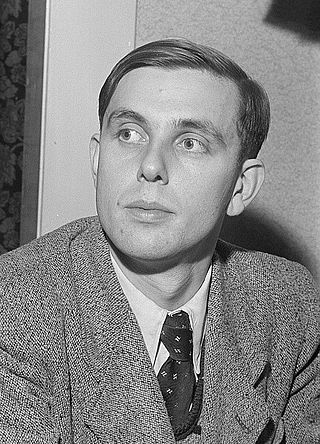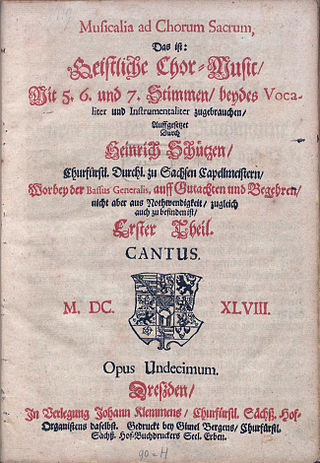
Musikalische Exequien, Op. 7, SWV 279–281 is a sacred composition that Heinrich Schütz wrote in 1635 or 1636. Written for the funeral services of Count Henry II, Count of Reuss-Gera, who had died on 3 December 1635, it is Schütz's most famous work of funeral music. It comprises the following sections:
Internationale Bachakademie Stuttgart is a foundation in Stuttgart, founded by Helmuth Rilling in 1981 to foster international concerts and workshops, namely Musikfest Stuttgart, dedicated especially to the music of Johann Sebastian Bach in relation to present day composition. Its director has been Hans-Christoph Rademann from 1 June 2013.
Marcus Ullmann is a German classical tenor.
The RIAS Kammerchor is a German choir based in Berlin, Germany. It receives support from the Rundfunk Orchester und Chöre GmbH Berlin, a limited-liability company owned by the public broadcasters Deutschlandradio (40%) and RBB (5%), the German Federal Republic (35%), and the State of Berlin (20%).
Gerlinde Sämann is a German soprano known for her performances in concerts and operas. She is particularly associated with the works of Johann Sebastian Bach. Her concert repertoire also includes lieder, oratorio, early music, and contemporary music.
Werner Güra is a German classical tenor in opera, concert and Lied, also an academic teacher in Zurich.
Wolfgang Schäfer is a German choral conductor and academic. He founded the Freiburger Vokalensemble, the BosArt Trio, and the Frankfurter Kammerchor.
Max Beckschäfer is a German organist, composer and academic.

Diethard Hellmann was a German Kantor and an academic in Leipzig, Mainz and Munich.
Morten Schuldt-Jensen is a Danish classical conductor.
Es ist ein Ros entsprungen is the setting of the Christmas carol Es ist ein Ros entsprungen for two choirs a cappella by Swedish composer Jan Sandström. The work of 1990, which incorporates the harmonization by Praetorius, is one of his signature compositions, along with his Trombone Concerto No. 1, the Motorbike Concerto.
The Dresdner Kammerchor is a mixed chamber choir which was founded in 1985 by Hans-Christoph Rademann in Dresden and is still conducted by him. The semiprofessional ensemble of about 40 singers has appeared internationally.

Frieder Bernius is a German conductor, the founder and director of the chamber choir Kammerchor Stuttgart, founded in 1968. They became leaders for historically informed performances. He founded the Stuttgart festival of Baroque music, "Internationale Festtage Alter Musik", in 1987, and is a recipient of the Edison Award (1990), Diapason d'Or (1990) and the Order of Merit of the Federal Republic of Germany (1993).

Roderich Kreile is a Lutheran church musician, choir director and university teacher. Since 1997, he has been the director of the Dresdner Kreuzchor at the Kreuzkirche, Dresden, as the 28th Kreuzkantor since the Reformation.

Psalmen Davids is a collection of sacred choral music, settings mostly of psalms in German by Heinrich Schütz, who had studied the Venetian polychoral style with Giovanni Gabrieli. Book 1 was printed in Dresden in 1619 as his Opus 2. It comprises 26 individual settings, which were assigned numbers 22 to 47 in the Schütz-Werke-Verzeichnis (SWV). Most of them use the text of a complete psalm in the translation by Martin Luther.

Geistliche Chormusik is a collection of motets on German texts for choir by Heinrich Schütz. It was printed in Dresden in 1648 as his Opus Undecimum, and comprises 29 individual settings for five to seven voices, which were assigned numbers 369 to 397 in the Schütz-Werke-Verzeichnis (SWV). The original title was Geistliche Chor-Music, Erster Theil which indicates that Schütz planned a second part. It is also known as Geistliche Chor-Music 1648. The collection contains earlier and new works and a German arrangement of a motet by Andrea Gabrieli.

Christoph Siebert is a German choral conductor, coaching and directing ensembles including the Collegium Vocale Gent. He is also an academic teacher in the field.
MDR Rundfunkchor is the radio choir of the German broadcaster Mitteldeutscher Rundfunk (MDR), based in Leipzig, Saxony. Dating back to 1924, the choir became the radio choir of a predecessor of the MDR in 1946, then called Kammerchor des Senders Leipzig, or Rundfunkchor Leipzig. The present name was established in 1992. The choir has appeared internationally, and has made award-winning recordings.
Alexander Keuk is a German composer and music journalist.
Jauchzet dem Herren, alle Welt, SWV 36, is a choral setting of Psalm 100 in German for double choir by Heinrich Schütz. It is one of the Psalmen Davids, published in 1619. The psalm setting has been performed and recorded internationally.







